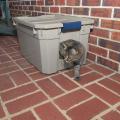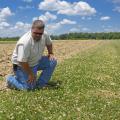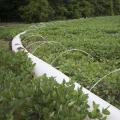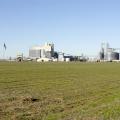Feature Story from 2015
STARKVILLE, Miss. -- A proven ability to work with producers, university professionals and industry representatives has earned Steve Martin new responsibilities with the Mississippi State University Extension Service.
STARKVILLE, Miss. -- Two Mississippi State University faculty members are participating in an executive leadership program to gain enhanced management skills and a broader perspective on food systems.
Mike Phillips, head of the Department of Plant and Soil Sciences, and Mary Beck, head of the Department of Poultry Sciences, began the Food Systems Leadership Institute program in the fall of 2015.
STARKVILLE, Miss. -- A longtime department head at Mississippi State University has been named the new director of the Southern Rural Development Center.
Steven Turner, who has served as head of the MSU Department of Agricultural Economics for 12 years, will officially begin as the center’s director Jan. 1.
STARKVILLE, Miss. -- Low voter turnout may not be a big deal to some Mississippians, but for a group of concerned experts with the Mississippi State University Extension Service, a lack of interest in the election process signals an educational opportunity.
Jason Camp, an Extension associate with the Center for Government and Community Development, said he and his colleagues wanted to boost involvement and interest in local government.
Ornamental grasses are reliable warm-season performers that keep on giving, even in winter landscapes. Their color and interesting texture make them great choices for any garden.
A couple of good ornamental grasses that I like are Gulf muhly grass and pampas grass.
Gulf muhly grass is a native plant that really performs in the winter. It flowers in billowy masses that resemble pink clouds in the landscape. The color will hold as long as there isn’t a hard freeze. Even after freezing temperatures, the flower heads keep their airy shape.
STARKVILLE, Miss. -- Mississippi State University Extension Service Director Gary Jackson recently was selected to be a professional member of North America’s first conservation organization.
Founded by Theodore Roosevelt and George Bird Grinnell in 1887, the Boone and Crockett Club promotes wildlife conservation and management, including sportsmanship, habitat conservation and the ethical standards of fair chase hunting.
FOREST, Miss. -- When the new year begins, so do commitments to drop extra pounds and live healthier lifestyles. But many people find it hard to keep these promises to themselves.
Walk-A-Weigh, a program of the Mississippi State University Extension Service, gives people the proper tools to change their lifestyles by helping them improve their eating habits and stick to regular exercise routines. It began as a pilot program in 2015 but will be offered statewide in 2016.
STARKVILLE, Miss. -- Sylvia Byrd is committed to improving the nutrition and health of low-resource households through her efforts as the new project director for the Mississippi State University Extension Service Office of Nutrition Education.
The workshop, a program of the 10-year-old collaborative Miss/Lou Rural Tourism Education Initiative, will look at technology trends and how to create virtual tours, along with other interactive sessions and activities.
STARKVILLE, Miss. -- The holiday season can be just as much fun for pets as it is for their owners if they are treated with love and care.
Dr. Joey Burt, associate clinical professor and hospital director at the Mississippi State University College of Veterinary Medicine, said pets should be treated as small children and not be kept outside in extreme weather.
STARKVILLE, Miss. -- People who care about honeybees know that insecticides and pollinators are usually a bad mix, but it turns out that herbicides used to control weeds can spell even bigger trouble for bees.
Jeff Harris, bee specialist with the MSU Extension Service and Mississippi Agricultural and Forestry Experiment Station researcher, said herbicides destroy bee food sources.
STONEVILLE, Miss. -- Because bees are important to the success of crops, honeybee health is important to Mississippi State University.
Jeff Gore, Mississippi Agricultural and Forestry Experiment Station researcher at the Delta Research and Extension Center in Stoneville, participated in a recent U.S. Department of Agriculture-Agricultural Research Service study of pesticide toxicity to honeybees. The study was conducted in Stoneville at the USDA-ARS Jamie Whitten Delta States Research Center. It was part of ongoing efforts to protect the population of pollinators.
STARKVILLE, Miss. -- Spared from avian influenza outbreaks in 2015, Mississippi’s poultry industry benefitted significantly from higher egg prices but still felt the pinch from export declines.
Preliminary estimates indicate a 3.4 percent increase in the state’s poultry value. The largest growth is an almost 40 percent increase for eggs. Chickens (replacement egg layers) may be up 5 percent, and broilers were near even with a 0.4 percent increase, according to recent estimates from the Mississippi State University Extension Service.
STARKVILLE, Miss. -- Estimates indicate that lower soybean prices caused the value of Mississippi’s top row crop to drop below $1 billion for the first time since 2011 despite producers posting the second highest yield on record.
STARKVILLE, Miss. -- Neither crop yields nor prices were particularly bad in 2015, but Mississippi’s estimated state agricultural production value still dropped to $7.2 billion, a 4.9 percent decrease from the previous year.
Brian Williams, an agricultural economist with the Mississippi State University Extension Service, said the decline in agricultural value has two causes.
STONEVILLE, Miss. -- About 190 people gathered Tuesday to focus on water use and conservation, a showing that demonstrates just how important this topic is to the Delta and state.
The Delta Sustainable Water Resources Task Force convened the 2015 Mississippi Delta Irrigation Summit in Stoneville. The event drew farmers, consultants, industry suppliers, university researchers, Extension agents and U.S. Department of Agriculture officials from Mississippi, Arkansas and Louisiana.
STONEVILLE, Miss. -- Mississippi State University researchers have identified a new disease that has reduced yields in several soybean fields across the state in recent years.
Researchers established the uniqueness of this fungus-based disease and have named it “soybean taproot decline.” It has symptoms similar to some other soybean diseases, including the yellowing of leaves while the veins stay green. Unlike other diseases that affect the crop during specific times in the growing season, soybean taproot decline is something producers will have to watch for year-round.
PICAYUNE, Miss. -- Staff at the Southeast’s premier nature conservatory now can spread the word about the facility and events to a broader audience.
The Mississippi State University Crosby Arboretum in Picayune received a $15,000 grant from Visit Mississippi and the Mississippi Development Authority. The arboretum was donated to MSU in 1997 by the arboretum foundation and is a unit of the MSU Extension Service.
The funds will be used to promote greater awareness of the public garden and increase site visits.
TYLERTOWN, Miss. -- An upcoming dairy conference will help Mississippi and Louisiana dairy farmers as they face more profit challenges in 2016.
The 26th annual Mississippi-Louisiana Dairy Management Conference will be Jan. 14 at the Southwest Events Center in Walthall County. The event begins with registration and exhibits at 8:30 a.m. Educational presentations begin at 9:15 a.m. and conclude with a sponsored lunch. The conference is free for dairy producers and managers, their family members and employees, and others with an interest in staying abreast of dairy farming issues.
Pages
Feature Story Archive
- 2025 (64)
- 2024 (116)
- 2023 (114)
- 2022 (112)
- 2021 (104)
- 2020 (140)
- 2019 (126)
- 2018 (141)
- 2017 (197)
- 2016 (240)
- 2015 (319)
- 2014 (355)
- 2013 (371)
- 2012 (343)
- 2011 (246)
- 2010 (236)
- 2009 (229)
- 2008 (188)
- 2007 (210)
- 2006 (199)
- 2005 (224)
- 2004 (215)
- 2003 (228)
- 2002 (176)
- 2001 (184)
- 2000 (188)
- 1999 (180)
- 1998 (178)
- 1997 (188)
- 1996 (58)
- 1995 (36)











